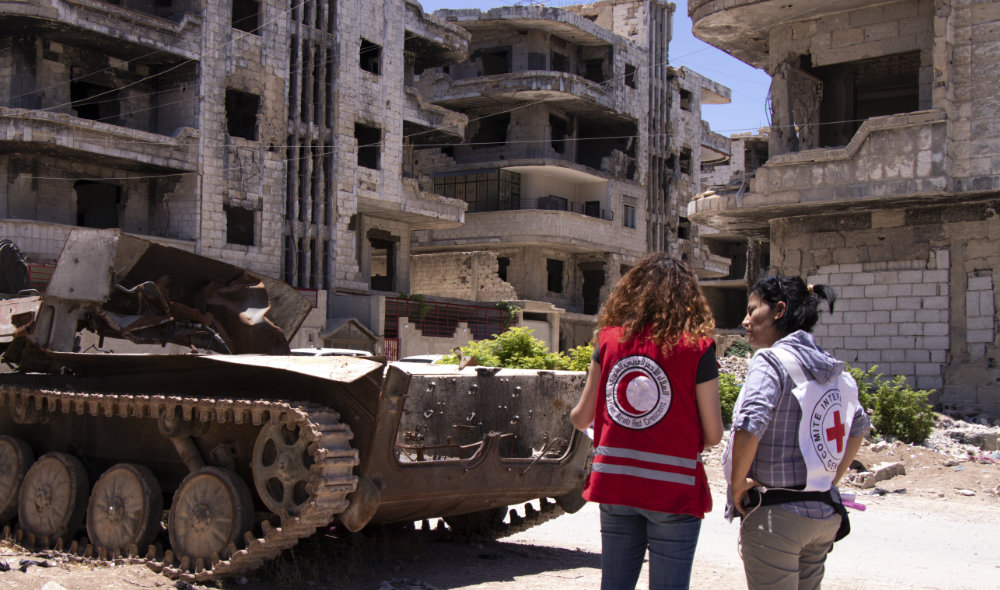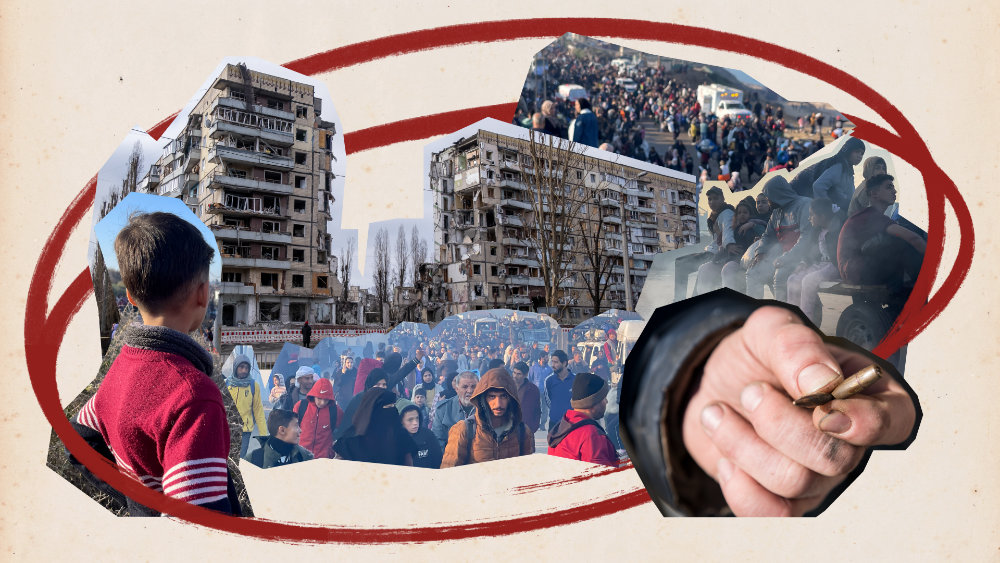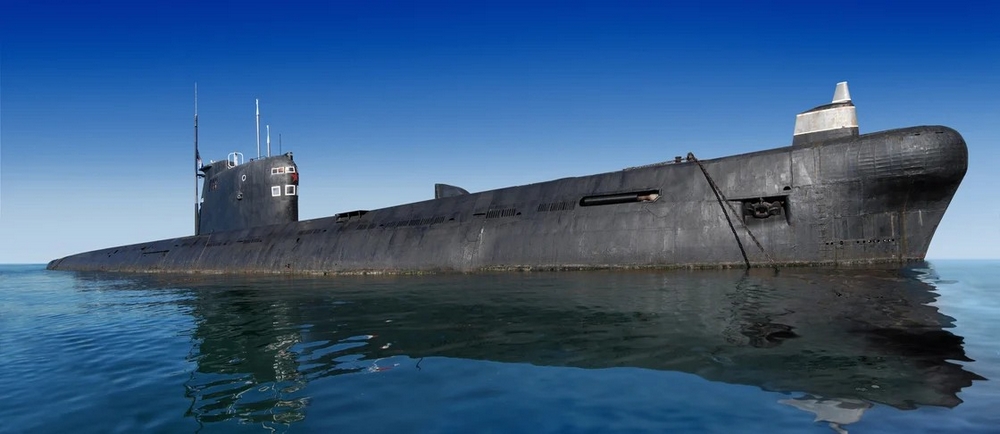Recent conflicts have brought to light the jarring personal dilemmas humanitarian workers confront and provoked legitimate questions about the validity of the principles of humanity, impartiality, neutrality, and independence as a framework to navigate them.
In this post, Olivier Ray, the ICRC’s Director of Mobilization, Movement, and Partnerships, reaffirms the principles’ enduring relevance precisely because of the sometimes-excruciating trade-offs and dilemmas humanitarian workers must face.
“We experience first-hand… the horrors of this war”, said senior medical officer Sandy Ingles of recent experience at the Red Cross field hospital in Gaza, his voice shaking. They have included seeing small children writhing in pain on the operating table. Some were saved; others succumbed to their injuries. Even far from the frontline, such horrors flashing across our television screens are enough to provoke anguish and outrage in anyone.
These are normal emotional responses by one human witnessing the suffering of another in war. They are useful because they tell us something is not right. Often, two other profound feelings follow: empathy and the desire to do something to help.
Responses to suffering may be many and varied, involving myriad different actors, from political negotiations with warring parties to public advocacy to individual charitable acts towards one’s neighbour. Henri Dunant’s response was to create the Red Cross – now an international Movement some 16 million strong – to provide relief when political action to prevent war failed.[1] It was also to mobilise states to create a body of law – international humanitarian law (IHL) – designed to ensure a minimum of humanity in war. This dual approach of action on the one hand and influence on the other continues to characterize the ICRC’s work and that of the wider Red Cross and Red Crescent Movement (the Movement) over 160 years later.
Humanity, impartiality, neutrality, and independence emerged through experience as principles to guide this dual approach, by the Movement in 1965 and affirmed in countless UN resolutions and other documents since.
However, from Gaza to Goma, the spectre of armed conflict has always provoked legitimate questions in the humanitarian sector and beyond about their enduring relevance and utility. Isn’t humanity enough? Do the other principles in fact hinder more than they help? There is a long history of humanitarian principles coming under pressure – think of Biafra and the immediate post-9/11 period, for example – but it is useful to revisit these questions periodically. Allow me to offer a perspective on them.
Humanity: what it’s all for
The principle of humanity has always been the driving force of humanitarian action, which seeks to prevent or alleviate human suffering wherever it may be found. It is the grundnorm or what Jean-Pictet, author of the commentary on the principles, described as “the essential principle’ underlying the humanitarian endeavour and the only one whose nature is profoundly moral”. Viewed in this light, it is not necessary to adhere to the other humanitarian principles to do humanitarian acts.
However, on the question of whether humanity itself is enough to sustain a humanitarian endeavour of the kind Dunant envisioned and which is still needed more than ever today, experience suggests that it is not. Indeed, ten years after the Movement formally adopted the principles, the landmark Tansley Report concluded that while humanity has “wide if not universal appeal and can be useful as a means of mobilizing support for the Movement”, it is “so broad that it serves as a poor guide to action or to the limitation of action. It is so vague as to permit all sorts of tasks which risk dissipating the effectiveness of the Movement”.[2]
Impartiality: recognising the dignity of each individual
The purpose of the other principles is to serve humanity despite the dilemmas humanitarian staff and the organizations they work for face, often in complex and chaotic environments with imperfect information and limited resources. Navigating such dilemmas may come down to choosing the least bad option between two morally compromised solutions.
To jettison impartiality, for example, would essentially amount to restricting compassion to those we emotionally identify with while deprioritising and, ultimately, dehumanising the ‘other side’ of a conflict. Hence the 1864 Geneva Convention obliges belligerents to provide impartial care to all wounded and sick on the battlefield, despite the moral dilemmas this entails for medical personnel who may sometimes have to prioritise the medical needs of enemy combatants over those of their own side’s soldiers.
The impartiality principle elevates humanitarian concern for one’s own community to humanitarian concern for all victims on all sides of a conflict, based on our shared human needs, and regardless of status, affiliation, and other factors. This may at times challenge personal convictions. But humanitarian action has never been about avoiding uncomfortable dilemmas, and rather, about finding ways to navigate them in service of humanity as a whole. A victim is a person in need of humanitarian protection and assistance; humanitarian principles do not allow distinguishing between ‘guilty victims’ who do not deserve life-saving assistance for belonging to the wrong side, and those worthy of support.
Neutrality and independence: means to an end
If humanity and impartiality represent the ethical foundation of humanitarian action, neutrality and independence are above all practical tools for making humanity and impartiality a reality.
Of course, adherence to the principles is as much about perception as actual practice, and actual practice is often more a question of degree than absolutes. However, over time, the ICRC’s overall consistent adherence to the principles in its policies, decisions, and actions has enabled it to build trust with parties able to influence humanitarian outcomes.
In Afghanistan, for example, the deliberate killing of an ICRC staff member in 2003 and seven others in two separate incidents in 2017 caused the organization to deeply question whether its reputation for neutrality and effective work could protect its staff from attack. Rather than abandon neutrality, the ICRC persevered in its dialogue with all parties and managed, through its actions, to demonstrate the benefits of having a neutral intermediary in conflict, and thereby continue its 30-year presence to support thousands of Afghans and the services on which they depend.
For instance, the ICRC provided humanitarian services for people in areas controlled by the then Government of Afghanistan as well as in areas controlled by the Islamic Emirate of Afghanistan (IEA), which helped to temper perceptions that it was too close to one or other side. Such services included thousands of war wounded and human remains transfers across frontlines, and providing neutral spaces for planning immunizations. Years later, that same neutrality – and the trust it had built – allowed the ICRC to engage the IEA when it effectively became the governing authority in 2021, when other non-neutral actors could not or would not due to sanctions and political barriers. Supporting 33 major health facilities reaching over 26 million people helped keep the country’s health system on life support until the authorities could assume their responsibilities and other actors could step in.
Meanwhile, the ICRC continued to engage the IEA in confidential dialogue with the aim of addressing a number of other humanitarian issues, and publicly expressed its concern over the IEA’s exclusion of women and girls from the education system, even though – in the eyes of some in the IEA – doing so was ‘siding with the West’, an association which led to the murder of its staff almost two decades earlier. The ICRC, however, broached excluding women and girls from education and work as a humanitarian issue with potential long-term impacts, which required urgent attention.
The ICRC approaches its engagement with parties in the same way worldwide, including state authorities in the over 100 countries in which it operates and almost two thirds of the 450 armed groups it mapped as being of humanitarian concern in 2023. This helped to make possible, for example, the exchange of hundreds of detainees on both sides of the conflict in Yemen in 2019 and 2023, with the ICRC acting as a neutral intermediary not only to carry out the exchanges logistically, but also to identify family members, perform health checks, and provide livelihood support.
These examples show that neutrality is not an expression of detachment or moral indifference, nor does it imply silence. While, in the case of ICRC staff, neutrality and independence do demand professional discretion with parties and in the public domain given the ICRC’s primary means of influence is through confidential bilateral dialogue, they do not require colleagues to suppress the very emotions and concerns which make us human.
The kinds of activities described above would simply not be possible if the ICRC did not make conscious and consistent efforts to be perceived as neutral and acting independently of political and other interests. Even then, as illustrated by the challenges involved in accessing all prisoners of war in the Russia-Ukraine international armed conflict, carrying out humanitarian activities may not be straightforward.
The principles and the Movement
The relevance of humanitarian principles as practical guides for humanitarian action extends beyond an international organization with a specific mandate such as the ICRC. National and local humanitarian actors such as Red Cross and Red Crescent Societies must be able to operate in conformity with humanitarian principles to be recognised under the Movement Statutes. The Safer Access Framework (SAF) is one tool which helps them do just that to enhance the acceptance, security, and access of National Society staff in the communities they serve.
The Lebanese Red Cross (LRC), for example, is the main provider of emergency medical services in the country. The LRC provided, for example, lifesaving ambulance services to over 3,000 wounded in the 2020 Beirut port explosion, and provided shelter, food aid, hygiene kits, primary health services, and psychosocial support to more than 150,000 people in a second response phase.
The effectiveness of this response affirmed the conclusion of an earlier case study of SAF application in Lebanon:
“It is clear that, in the context of Lebanon, the Fundamental Principles are more than an abstract code or ideological commitment. They serve as a framework for action and an operational tool to guide decision-making in very difficult circumstances. They are of particular relevance to a National Society which needs to balance its role as a formal auxiliary to the public authorities with the ability to provide, and to be trusted to provide, neutral and independent humanitarian assistance for all those who need it most. One of the most important lessons from Lebanon is that this does not come about by accident or without considerable and consistent effort.”
Conclusion: the principles are a public good
It is tempting to dismiss principles as outdated when they are tested. But it is precisely when they are tested that they are most needed.
Over time and space, the four humanitarian principles have demonstrated their value as an analytical prism, ethical compass, and operational tool for thinking critically and pragmatically about ways around the obstacles that political and conflict realities create for humanitarian action. They can and should continue to do so in the face of new challenges, such as those posed by digital technologies and mis and disinformation. This is why states and all Movement components are preparing to reaffirm their commitment to them at the Movement’s next statutory meetings in October. And their relevance continues to extend beyond the Movement to humanitarian action generally.
That war still happens, creates unspeakable suffering, and leaves many of us feeling powerless is not because humanitarian principles are lacking; it is because the will and ability of states and other actors to solve problems through other means is lacking. Creating conditions conducive to peace is one of the most important responsibilities of states and their political leaders.
This is not for a moment to downplay the excruciating dilemmas humanitarian workers face, particularly those seeing their own communities torn apart. Humanitarian principles do not guarantee easy or perfect solutions. But in the chaos of conflict, from the Movement’s perspective, there is no better alternative; no better alternative to remind us that we have the same human needs, and that our enemies love their children, mothers, and fathers as much as we do. Recognizing that, even in situations of extreme hostility, we have more uniting us than dividing us is not a naïve denial of complexity; it is keeping hope alive that humankind can not only avoid a downward spiral into hatred, barbarity, and destruction, but in fact rise up towards a better world; a world where no life will be cut short in a field hospital in Gaza. Humanitarian principles are a public good the world needs today more than ever.
[1] The Movement now also provides humanitarian services outside situations of armed conflict. See https://www.icrc.org/en/movement; AnnualReport2022_Final-web NEW.pdf (ifrc.org)
[2] The Final Report: An Agenda for Red Cross (July 1975), or the so-called Tansley Report, was a detailed re-appraisal of the role of the entire Red Cross and Red Crescent Movement.
See also:
- Marina Sharpe, It’s all relative: the humanitarian principles in historical and legal perspective, March 16, 2023
- Pierrick Devidal, ‘Back to basics’ with a digital twist: humanitarian principles and dilemmas in the digital age, February 2, 2023
- Fiona Terry, Taking action, not sides: the benefits of humanitarian neutrality in war, June 21, 2022
- Robert Mardini, Back to basics: humanitarian principles in contemporary armed conflict, June 16, 2022






Comments